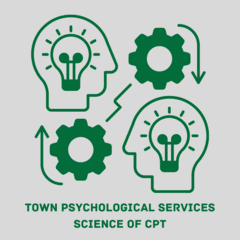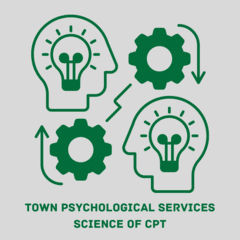Town Psychology
最近の記事

The Science Behind Cognitive Processing Therapy (CPT)
This episode dives deep into the science of CPT, explaining how it rewrites the script in your mind. No psychobabble, just practical strategies to finally break free from negativity. Join us and unlock the power to heal, thrive, and live the life you deserve. Follow https://townpsychology.ca/cognitive-processing-therapy/ to learn more The science behind Cognitive Processing Therapy (CPT) centers on the idea that our thoughts, emotions, behaviors, and bodily sensations are all interconnected. Here's a breakdown of the key concepts: Cognitive Processing: Our brains naturally try to make sense of experiences, especially traumatic ones. This processing can lead to the formation of beliefs about ourselves, the world, and the future. However, after trauma, these beliefs can become distorted and unhelpful. Cognitive Distortions: These are negative thinking patterns that can worsen our emotional state and hinder recovery. Examples include: 1. Jumping to Conclusions: Assuming the worst without evidence. 2. Emotional Reasoning: Believing your emotions are facts ("I feel worthless, therefore I am worthless"). 3. Catastrophizing: Blowing out of proportion the likelihood of negative outcomes. The Science of Change: CPT is built on well-established principles from cognitive psychology. Here's how it works: 1. Identifying Cognitive Distortions: The therapist helps you recognize unhelpful thinking patterns associated with your trauma. 2. Cognitive Restructuring: You learn to challenge and re-frame these distortions with more balanced and realistic beliefs. 3. Emotional Regulation: By changing your thoughts, you can learn to regulate your emotions and develop healthier coping mechanisms. Evidence for Effectiveness: Extensive research supports the effectiveness of CPT in treating PTSD and other conditions. Studies show CPT can significantly reduce: 1. Intrusive thoughts and memories 2. Avoidance behaviors 3. Negative emotions like depression and anxiety Brain Imaging: While research is still ongoing, some studies using brain imaging suggest that CPT may actually alter brain activity in areas related to emotional processing and memory. Overall, the science behind CPT emphasizes the power of our thoughts to influence our emotional state and overall well-being. By learning to identify and challenge unhelpful thinking patterns, CPT empowers individuals to take control of their mental health and build a brighter future.

Psych On The Mic
Ever wondered what goes on behind the closed door of a therapist's office? In this episode we ditch the stigma and dive into the world of psychology with an actual psychologist! We'll discuss about how therapy can help with everything from everyday stress to anxiety and depression. Visit https://townpsychology.ca to learn more about In coming episodes, we'll also explore different types of therapy and answer your burning questions like "Is therapy right for me?" and "What should I expect in a session?" So, grab your headphones and get ready to learn how to take charge of your mental health!

